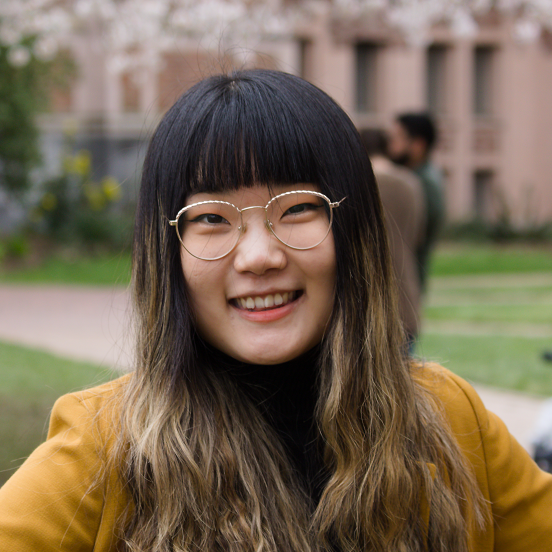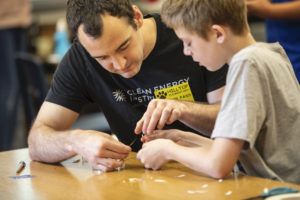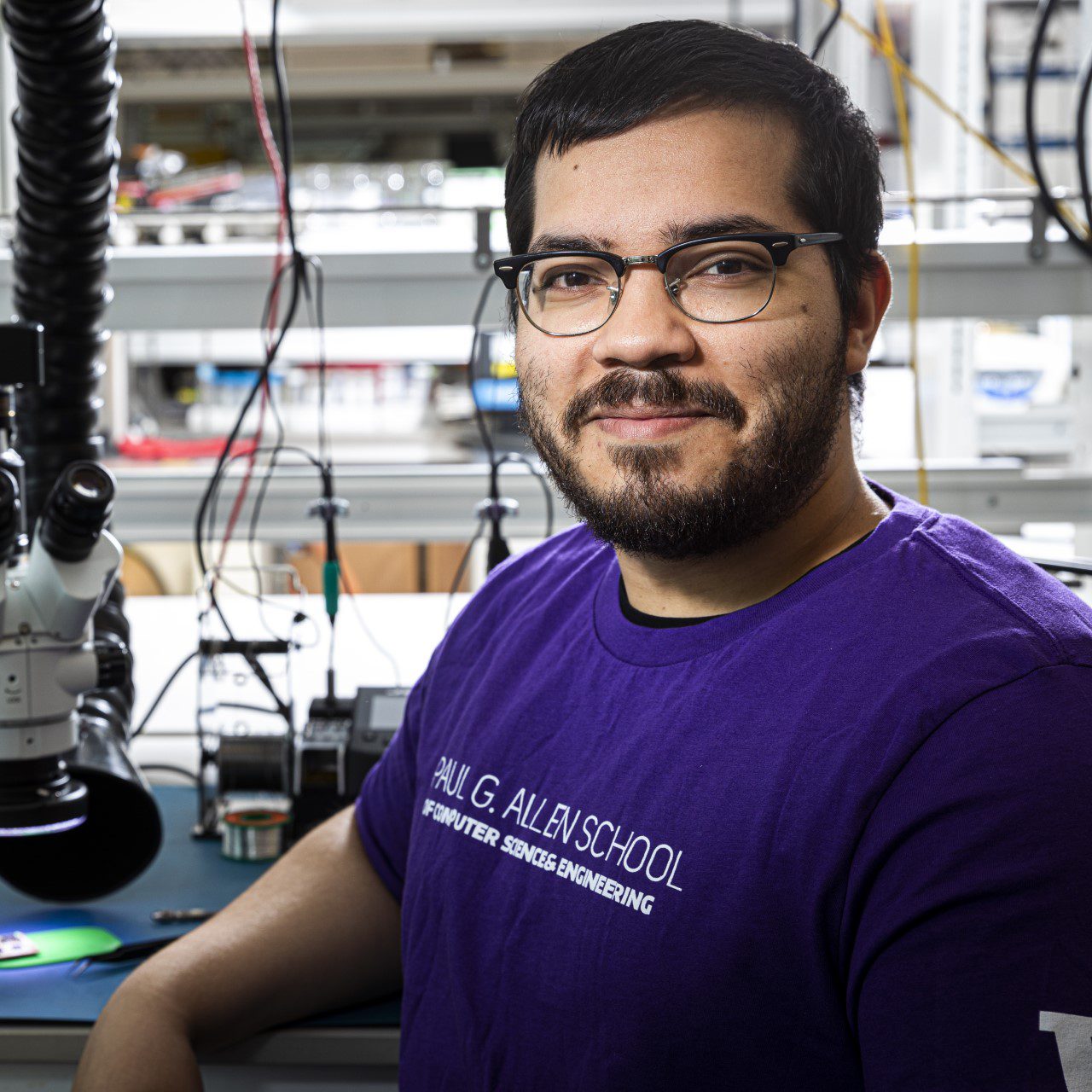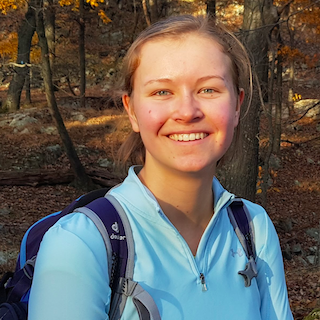Program Details
CEI Clean Energy Ambassadors are UW graduate and undergraduate students in STEM fields who lead students in hands-on activities at K-12 schools around Washington state and present at community and school events such as UW Engineering Discovery Days and local STEM Fairs. Ambassadors hone their skills at communicating science to the public and gain first-hand experience with programs that support broader impacts. Ambassador activities include Solar Car Races, a Meet a Scientist presentation, or any of our Lessons including hands-on workshops on Mini Solar Panels or Solar Spinners.
UW Students
Sign up to become a Clean Energy Ambassador and read lesson plans used in K-12 engagement visits.
Meet a Clean Energy Researcher
Vicente Arroyos
I’m Vicente Arroyos, a CEI Graduate Fellow and Ph.D. candidate at the University of Washington Paul G. Allen School of Computer Science & Engineering. Beyond the lab coat and research papers, I’m a dedicated advocate for humanizing scientists, sparking enthusiasm for science in young minds, and expanding awareness of STEM academic and career opportunities.
My research in the realm of microrobotics focuses on creating autonomous, battery-free microrobots with applications ranging from environmental monitoring to agricultural optimization. Imagine tiny, intelligent machines that can navigate confined spaces, perform environmental inspections, and contribute to sustainable practices in industries. My journey began during my undergraduate studies in Electrical Engineering, where I delved into interdisciplinary research on bi-stable origami robotics. This paved the way for my Ph.D. pursuits, where I overcame technical challenges to develop groundbreaking micro-robotic systems featured in renowned publications and conferences.
My academic path reflects a commitment to innovation and a desire to bridge the gap in STEM education. As a first-generation college student and former migrant farm worker, my personal experiences drive my dedication to diversity and inclusion in STEM. Beyond academia, I co-founded AVELA: A Vision for Engineering Literacy and Access, a nonprofit fostering STEM education in underserved communities and schools. Looking forward, my career paths extend from academia to entrepreneurship, envisioning roles as a professor, mentor, and entrepreneur dedicated to creating impactful solutions for global challenges.
Rose Lee
My name is Rose Yesl Lee, and I am a Ph.D. student in the chemical engineering department, a CEI Graduate Fellow, and a 2024-25 CEI Education and Training Fellow. As a member of the Schwartz and Liu research groups, I work on building better batteries to enable the electrification of transportation and decarbonization of the grid.
Growing up as someone with a learning disability, I found science to be totally confusing and scary. However, during my senior year of high school, I was motivated by something even scarier — climate change — to start seeking scientific solutions. This motivation drove me to pursue an undergraduate degree in chemical engineering, where I dove into clean energy research by getting involved in electrochemistry groups at the university and national labs. Getting to see science applied to solve real world problems in the lab was exciting, and it inspired me to work harder in my courses. To keep the clean energy research momentum going, I decided to go for a Ph.D. in chemical engineering.
My research at the UW focuses on using advanced electrochemical testing and physics-based models to characterize next-generation anode materials, namely hard carbon anodes for sodium-ion batteries and lithium metal anodes for lithium metal batteries. Basically, to make a battery that is more affordable, lasts longer, and/or carries more energy than the current lithium-ion battery, we need a better understanding of what’s happening inside the battery as it’s being used. To achieve this, I make coin cells (which are the button-shaped batteries used in watches) with novel battery materials in the lab. I then repeatedly charge and discharge these coin cells and use a technique called nonlinear electrochemical impedance spectroscopy to observe the behavior of the battery. The data from these experiments gets fed into a Python program, where a bunch of mathematical expressions are used to give us a better insight on the battery’s physics. If all goes well, my work will contribute to making the next best battery, which could lead to more affordable electric vehicles, phones and laptops that last longer, and integration of clean energy into the grid.
Outside of the lab, I enjoy baking, painting, scrolling on TikTok, playing games like Baldur’s Gate and Fortnite (no builds), and planning/attending outreach events! The future of sustainability lies in the next generation, and outreach is critical to lowering the accessibility barrier to pursuing STEM. I remember what it was like for me — an immigrant, a woman, and a neurodivergent student — to struggle through the science curriculum, so as a CEI ETF, I try to make the lessons as accessible as possible.
Anna Okounkova
My name is Anna Okounkova, and I am a fourth year Ph.D. student in the physics department at the University of Washington and a CEI Graduate Fellow. I do experimental condensed matter research studying 2D materials in the Yankowitz lab. Throughout my graduate school experience, one of the things I have found the most rewarding is showing students how accessible research is and the incredible things we can achieve in a laboratory setting.
In the lab, I make nanoscale devices by stacking different two-dimensional materials, such as graphene, into specially designed heterostructures. I then use electron beam lithography, chemical etching, and metal vapor deposition to fabricate these stacks into circuits that I can measure. To give an idea of the scale, each device is less than a fifth of the width of the average human hair. I then electronically probe my nanoscale circuit at near zero temperature and with large applied magnetic fields. The design of the structure to drive certain properties in the 2D materials, combined with the extreme environment allows us to experimentally realize incredible exotic phases such as Bose Einstein condensation and superconductivity.
I became interested in my field early on thanks to a passionate 9th grade physics teacher, and I continued to pursue physics in college. Though I enjoyed my classes, it was not until I started doing research in my sophomore year of college that I developed a real love for this field. Physics research in experimental condensed matter is accessible to all undergraduate students; there is a lot that you can accomplish that you will build background knowledge for as you go, and any student can make significant contributions to the research due to the individual nature of fabricating devices. I have dedicated a lot of time in grad school to spreading the word about my research, such as through lab tours to students ranging from middle school to graduate school and mentoring undergraduate students who were interested in doing physics research. Next, I plan to keep focusing on mentorship and outreach while continuing to do research in 2D materials.
Vicente Arroyos
CEI Graduate Fellow
(2023-24)
Computer Science & Engineering

Rose Lee
CEI Graduate Fellow
(2022-23)
Chemical Engineering
Anna Okounkova
CEI Graduate Fellow
(2024-25)
Physics






